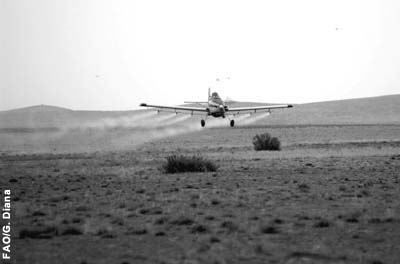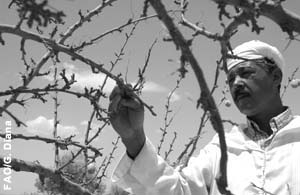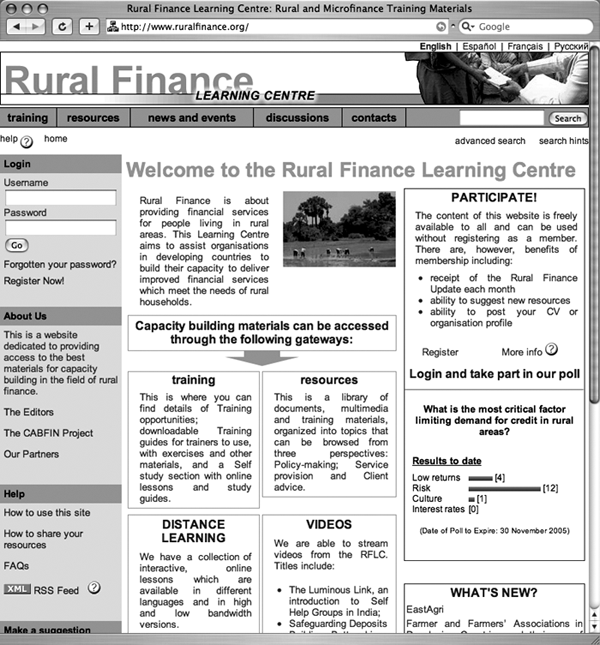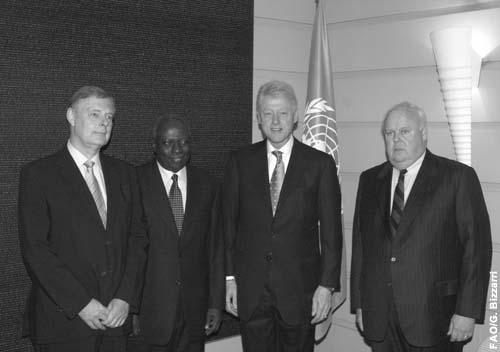New report on food security in Africa: IFAD, WFP AND FAO contribute
During 2005, IFAD, WFP and FAO worked with the African Union on a major new report on food security in Africa. The report, commissioned by the African Union, was presented to African Heads of State at their summit meeting in Abuja, Nigeria, in July 2005.
The report is designed to provide a food-security road map - giving detailed information about the current situation in Africa and indicating the way forward - for use by governments, NGOs, the private sector, and bilateral and multilateral partners.
“Each country will develop its own food security policy and strategy, drawing on NEPAD's Comprehensive Africa Agriculture Development Programme,”said Haladou Salha, WFP's Senior Advisor for Africa. NEPAD is the New Partnership for Africa's Development.
The African Union plans to update the report every year, with the continued cooperation of IFAD, WFP and FAO. Also on the drafting committee are the NEPAD Secretariat and the UN Economic Commission for Africa (UNECA).The regional African economic communities, such as the Common Market for Eastern and Southern Africa (COMESA) and the Intergovernmental Authority for Development (IGAD), are also being consulted.
“The report will have wide-ranging implications for the way forward to tackle food security in Africa,”said Mohamed Béavogui, Director of IFAD's Western and Central Africa Division.“It will further enhance the commitment of governments to putting food security at the top of their development agendas with a view to combating rural poverty.”
Agencies fight locust upsurge together



A massive Desert Locust upsurge infested 18 African countries during the summer of 2004, threatening millions of hectares of crops. Responding to the call of FAO, several donors including IFAD and the affected countries came forward and contributed some US$ 80 million towards a control campaign. Despite commendable mobilization efforts, and because of the magnitude of resources involved, the funds did not arrive in time and a major control programme had to be launched. Nearly 13 million hectares of infested land had to be treated to protect crops.
The response of FAO, IFAD and WFP to the locust crisis underscored the strong relationship among the three agencies. IFAD funded two projects managed by FAO in support of 10 affected countries. WFP provided airplanes to transport pesticides to strategic locations. Joint crop and food supply assessment missions in nine affected countries were carried out before the end of the main harvest to assess the needs for food and agricultural assistance in view of the 2004 United Nations Consolidated Appeal Process for West Africa.
Current activities focus on monitoring the locust situation and building up the capacity of affected governments to respond to future Desert Locust emergencies. This also includes the capacity to prevent and monitor the environmental effects of pesticides. For the medium term, IFAD is supporting the testing and validation of innovative, environmentally friendly, preventive (rather than curative) approaches to desert locust management, based on the lessons from the current campaign.
Building capacity in rural finance

Understanding and systematically applying recommended practices is challenging in any industry and especially important when it comes to money. FAO and IFAD have a long history in rural finance practice, research and knowledge sharing. The two organizations are currently collaborating on a rural finance training curriculum that is being taught in leading micro-enterprise training centres and further developed as distance learning modules. Some of the training material will be made available soon to a larger audience in the field via the Web-based Rural Finance Learning Centre (www.ruralfinance.org). Through the Rural Finance Learning Centre, FAO, IFAD, the World Bank and GTZ support capacity building and diffusion of best practices in rural finance.
Poverty Reduction Strategy: rural focus initiative
The Poverty Reduction Strategy approach was initiated in 1999 by the World Bank and the International Monetary Fund as a way of making development aid more effective in reducing poverty.Today, some 35 low-income countries have developed poverty reduction strategy papers, or PRSPs. These strategies are now seen as the country-level framework for achieving the Millennium Development Goals.
Concerned that the rural sector has not received adequate attention in poverty reduction strategy processes, FAO, IFAD, WFP and other agencies are working together to help countries sharpen the rural focus of their PRSPs.
The initiative focuses on strengthened country-level engagement and collaboration to support:
formulation and implementation of sector policies and strategies;
capacity building in economic and sector work;
participatory monitoring and evaluation systems, and poverty and social impact assessment;
empowerment of rural stakeholders, producers' associations and decentralised entities through institutional and organizational strengthening and participation in policy processes.
Reviews and case studies will document successes, failures and lessons learned from experience, and fill gaps in existing knowledge. Advocacy, networking and communication will be employed to influence the international agenda.
Agencies team up to build management skills
Through a unique project called the Management Development Centre, WFP, FAO and IFAD are working collaboratively to develop management skills among their staff.The Centre - funded by the U.K. Department for International Development (DFID) and jointly organized by the Human Resources divisions of the three agencies - provides initial two-day sessions that start participants on a learning curve to greater management ability.
Currently each agency sends a maximum of four staff to each Management Development Centre session. Six sessions have been held since the programme began in October 2004. Participants undergo a series of assessments of their management-related competencies, interpersonal abilities, and communication and presentation skills. After an exhaustive review, the candidates emerge with an indication of their strengths, areas for improvement and suggestions for how to move forward. Then, each participant draws up an Individual Learning Plan for a continuous long-term process of development and improvement.
The response from participants has been uniformly favourable.“My assessors were very astute, insightful and created an enabling environment,”commented one participant.“The various tools proved very helpful in identifying my strengths,” noted another.The agencies will continue to collaborate on this initiative and identify other opportunities for staff development for UN Rome-based staff.

Former US President Bill Clinton conferred with the three executive heads of the Rome-based agencies in May 2005 in his role as Special UN Envoy for Tsunami Recovery.
Different mandates …
a common vision
| FAO was founded in 1945 with a mandate to raise nutritional levels and living standards, improve agricultural productivity and better the conditions of rural people. FAO is the leading agency for technical expertise in food security, agriculture, forestry, fisheries and rural development, and in the sustainable management of natural resources essential over the long term. |  |
| Viale delle Terme di Caracalla - 00100 Rome, Italy Tel.: +39-06-57051 -Fax:+39-06-57053360 E-mail: [email protected] - Web site: www.fao.org | |
| IFAD was established in 1977 to help developing countries fight rural poverty and hunger by mobilizing financial resources for rural and agricultural development. IFAD enables rural poor people to overcome poverty by: strengthening their capacity and that of their organizations; improving equitable access to productive natural resources and technology; and increasing access to financial services and markets. |  |
| Via del Serafico, 107 - 00142 Rome, Italy Tel.: +39-06-54591 - Fax: +39-06-5043463 E-mail: [email protected] -Web site:www.ifad.org | |
| WFP, the food agency of the United Nations system, was created in 1963. It provides food aid to save lives in emergency situations, improve the nutrition and quality of life of the most vulnerable people at critical times in their lives, help build infrastructural assets and promote the self-reliance of poor people and communities. |  |
| Via Cesare Giulio Viola, 68 - 00148 Rome, Italy Tel.: +39-06-65131 - Fax: +39-06-6590632 -Telex 626675 WFP 1 E-mail: [email protected] - Web site: www.wfp.org |